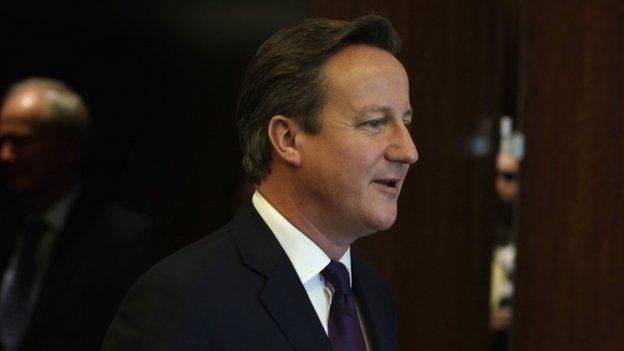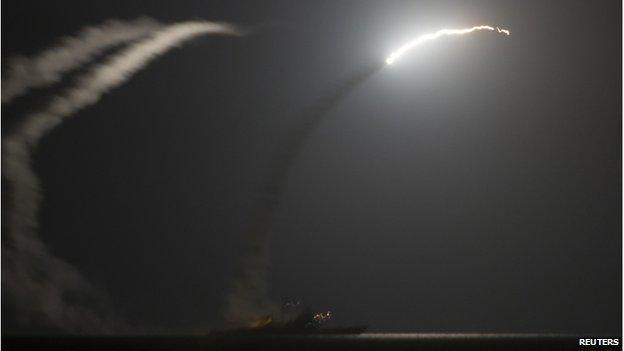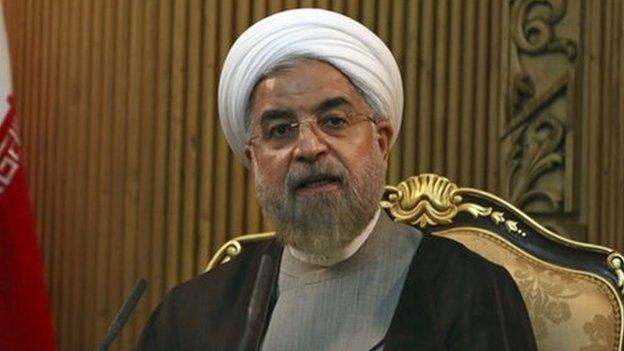David Cameron: No 'opt out' of Islamic State fight
- Published

David Cameron said a coalition was needed "right across the board" to tackle IS
The fight against Islamic State (IS) militants is one "you cannot opt out of", David Cameron has said.
Speaking to NBC News in the US, the prime minister said IS had oil, money, territory and weapons - and was "planning plots" around the world.
Mr Cameron, who will meet the president of Iran later, said an international coalition was needed to "destroy" IS.
His comments came after the US and five countries from the Gulf and Middle East began bombing IS in Syria.
'Evil organisation'
On Tuesday Downing Street said Mr Cameron, who is in New York for a UN General Assembly meeting, supported the air strikes.

The US has launched weapons including Tomahawk cruise missiles against IS targets in Syria
The UK has not joined the military action so far, but on Tuesday the Ministry of Defence said Britain had not ruled out the possibility.
The UK is already providing arms and surveillance support to Kurdish forces which are battling IS.
BBC political editor Nick Robinson said Parliament could be recalled by Friday if Labour and Lib Dems back UK military action.
He said Mr Cameron would "not risk" a repeat of the Commons defeat he faced last summer over air strikes in response to Syrian President Bashar al-Assad's use of chemical weapons.
But UK forces could take action in Iraq - where the US has been carrying out air strikes since last month - at the invitation of the government in Baghdad, he added.
Mr Cameron will have his first meeting with new Iraqi Prime Minister, Haider al-Abadi, later and it is thought Mr Abadi might make a formal request for the UK to join US air strikes against IS in Iraq.
Mr Cameron told NBC IS was not "leeching off another state as we had in Afghanistan with al-Qaeda and the Taliban", but was "controlling a state".
IS, also referred to as Isil and Isis, has taken control of large areas of Iraq and Syria in recent months.
"It has oil, it has money, it has territory, it has weapons and there's no doubt in my mind it has already undertaken and is planning further plots in Europe and elsewhere," Mr Cameron said.
He said IS had killed innocent people at a Jewish museum in Belgium and had been "attempting plots" in countries including the UK.
"The same applies to the United States of America, so this is a fight you cannot opt out of," he said.
"These people want to kill us."
He said a coalition was needed "right across the board" to "destroy this evil organisation."
Labour leader Ed Miliband said he backed US air strikes but Mr Cameron should seek a UN Security Council resolution to rally support.
The US, along with Bahrain, Qatar, Saudi Arabia, Jordan and the United Arab Emirates, used fighter jets, bombers and Tomahawk cruise missiles against IS targets in Syria on Tuesday.

President Hassan Rouhani and Mr Cameron are expected to discuss IS and Iran's position on Syria
Mr Cameron is expected to meet Hassan Rouhani later, the first time a UK prime minister has met an Iranian president since the Iran's revolution in 1979.
BBC correspondent Nick Bryant said relations between the UK and Iran had "thawed considerably" in recent months.
"Coming at a time when the Obama administration has said Iran has a role to play in combating IS, Mr Cameron is expected to gauge what form that might take," he said.
Mr Cameron is also likely to press Mr Rouhani to withdraw support for the Assad regime in Syria - a "hard sell", our correspondent added.
He said Iranian officials in the US had raised the possibility of a "trade-off" under which Iran could get concessions on advancing its nuclear programme in exchange for "further action" against IS - though the US has said the two issues are entirely separate.
The wife of the British hostage Alan Henning has urged IS to release him, as Ed Thomas reports
IS has threatened to kill British hostage Alan Henning, whose wife pleaded for his release on Tuesday. The threat was made in a video showing the beheading of Briton David Haines earlier this month.
Also on Tuesday, IS released a second video showing UK journalist John Cantlie reading from a script about IS.